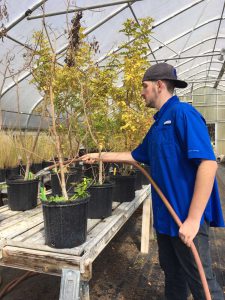
UF/IFAS College of Agricultural and Life Sciences student Ethan Church is pursuing a bachelor’s degree in forest resources and conservation from the UF/IFAS School of Forest, Fisheries, and Geomatics Sciences and a minor in soil and water sciences. When he’s not in the classroom, Ethan works as an undergraduate research assistant for the UF/IFAS Center for Aquatic and Invasive Plants (CAIP) under the guidance of Professor Stephen Enloe.
Two years ago, Church was attending Santa Fe College when a classmate told him about her new position at CAIP.
“I asked if there were any openings. The following week she told me she had asked, and they were interested so I went in for an interview,” Church said.
Last year, Church was acknowledged in a journal article by Enloe for his assistance with a Brazilian peppertree experiment. This study compared the efficacy of different herbicide carrier volumes (20 and 100 gallons per acre) on peppertree management. This study found that reducing carrier volumes appears to be more precise and more effective while resulting in less herbicide runoff.
“I assisted in several phases of this experiment, from the initial planting of the seedlings, transplanting them into bigger pots as they grew, watering the Brazilian peppertrees, applying the triclopyr, and recording data,” Church explained.
Church shares that he has had many unique experiences at CAIP as an undergraduate research assistant, working with both non-native invasive species and native species of plants.
“One of my main tasks is watering all the plants through the lab, some with specific watering requirements,” Church said. “I have also recorded data in the many projects I have participated in, anywhere from measuring plant height and plant stem diameter to destructive sampling and weighing root and foliage mass.”

As he became comfortable working on in a research setting, Church appreciated the direction and advice he gained from others with more experience.
“I was so nervous working on some projects and scared to mess up, so if there are any uncertainties on what to do, don’t be afraid to ask questions and get clarification.”
After graduation, Ethan hopes to become a natural resource extension agent.
“I think that it is a great fit for me as it gives me the opportunity to educate people on topics relating to natural resources, help solve [social] problems and be an active part of the community.”
If you are an undergraduate student interested in working with the UF/IFAS Center for Aquatic and Invasive Plants, email caip@ifas.ufl.edu.
Follow UF/IFAS CAIP on social media at @ufifascaip. Read more blogs like this one on the UF/IFAS CAIP blog.
UF/IFAS Center for Aquatic and Invasive Plants. Turning Science Into Solutions.
 0
0
